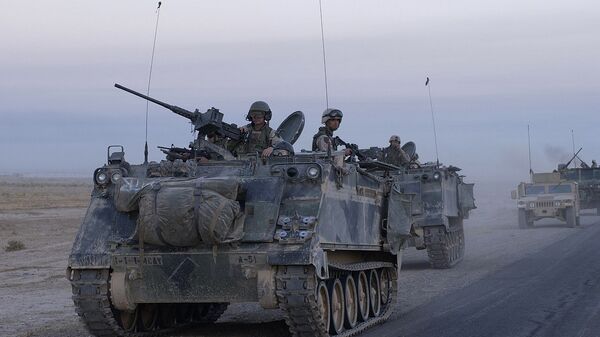Sputnik: What repercussions of the invasion of Iraq can we still witness in the Middle Eastern country after fifteen years?
Professor Seyed Mohammad Marandi: I’ve just recently returned from Iraq. I’ve been there a number of times over the last fifteen years. The situation has not improved overall. The infrastructure of the country is utterly destroyed in much of the country.
The United States has really done nothing to rebuild the country as the country that destroyed much of the infrastructure. We have to keep in mind that this whole process of destroying Iraq has been done through the United States, British, French and German support, and Canada well before the 2003 invasion.
They helped create Saddam Hussein’s the war machine, they helped him massacre his own people, they gave him weapons of mass destruction to use against his own people, as well as Iranians – they gave him chemical weapons.
In the [Iraqi] war against Kuwait they destroyed much of Iraq; they imposed sanctions on the country, which choked more than a million children. Back then, if you recall, the US Secretary of State Madeleine Albright, when asked about the death of a million children because of the sanctions, she said it’s worth it. This forty-year process obviously led to further destruction and the invasion of Iraq by ISIS [Daesh*]. So, when you look at the forty-year process, the United States has done nothing but create misery for Iraqi people and for the people across the region.
Among Iraqis there is a general contempt: for example, I’ve spoken with an Iraqi who said one of his relatives has a child who was born with a major physical defect and the reason he said was the depleted uranium that the Americans used during the war. And this radioactivity is creating misery, and the Americans have never done anything to clean up this mess.
Those people who have children, many of them have major defects that deformed children as a result of what the United States did many years ago. But the general sense of misery among Iraqis is very extensive, because their lives have been wrecked, the country has been wrecked, even now they are afraid of ISIS, car bombs, and they all know that the United States allowed ISIS to thrive, they allowed the extensive oil trade between ISIS and Turkey to take place for years until the Russians actually began bombing those convoys of oil.
Iraq has not only suffered because of the US direct action against the country, it suffered as a result of the US’ action against its neighboring countries – both in Syria and also the Iran-Iraq war itself.
Sputnik: What’s the underlying motive for the invasion in 2003? Obviously, it was underpinned by the oil industry and the management of the oil revenues, etc.?
Professor Seyed Mohammad Marandi: The United States is not in Iraq right now to help improve the quality of life. They want to keep their military in Iraq present permanently. The US has the largest embassy in the world in Iraq. <…> One reason for the invasion was, of course, for the sake of the Iraqi oil. The US vice president at that time was saying "our expenditures will be met through the export of the Iraqi oil," as if it’s their oil.
Of course, other economic benefits that they perceived that they would gain. The second is, of course, regional hegemony. I should divide the second into two parts. There’s regional hegemony. By invading Iraq, they could destroy the Syrian government or the Iranian government and they could enhance their regional hegemony.
READ MORE: Iraq Ready to Cooperate With Turkey on Securing Common Borders
The US regime wants absolute control – we see its behavior towards Russia. It can’t stand Russia because it can’t stand any country that is seen as not being controlled by the United States. We see it increasingly towards China, and, of course, Iran – it’s been like that for many decades now.
The United States, what it’s done in Syria, for example, is very similar to what it did to Nicaragua. Why did it try to destroy Nicaragua through the Contra rebels who were like ISIS, like al-Qaeda? Because they believed that Latin America was their backyard.
Even when one small country like Nicaragua or Cuba becomes independent, the Americans will make them suffer until they surrender. That’s what the US did in Vietnam. That’s the general pattern.
*Daesh (also known as ISIS/ISIL/IS) is a terrorist group banned in Russia
The views and opinions expressed in this article are those of the speaker and do not necessarily reflect those of Sputnik.




